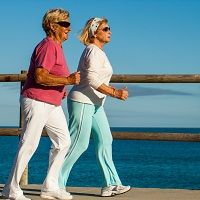Article
Above All Else, EULAR's Fibromyalgia Recommendation is Simple: Exercise
Author(s):
In an extensive review of previous studies and trials, the European League Against Rheumatism has assigned recommendations for and against various pharmacological and non-pharmacological fibromyalgia treatments.

Fibromyalgia, the vexing rheumatic condition that causes widespread pain and tenderness in as much as 4% of the population, still has neither a clear cause nor a consensus treatment. In a wide-ranging new review of studies on fibromyalgia treatments, the European League Against Rheumatism (EULAR) evaluated over two dozen pharmacological and non-pharmacological treatment methods and found only one, exercise, to be successful enough to warrant a unanimous “strong for” recommendation.
The organization’s original recommendations, released in 2005, predated much of the evidence discussed in this new document, relying primarily on expert opinion. In the decade that has passed, a wealth of individual trials have emerged, providing the basis for these new recommendations.
An aspect of this review was an evaluation not just of the results, but of the quality of the studies themselves. Non-steroidal anti-inflammatory drugs (NSAIDs) were given a “weak against” opinion due to a lack of evidence of their effectiveness above placebo in the single review EULAR considered; another NSAID study was deemed “low quality” and thus not considered. Another pharmacological treatment, the use of strong opioids, was given a “strong against” opinion due to a lack of evidence proving their efficacy and the risk of substantial side effects.
Non-pharmacological fibromyalgia treatment methods were met with mixed results. As with opioids, chiropractic treatment was also stamped “strong against” due to little positive proof and significant potential risks. “Weak against” was assigned to capsaicin (due to mixed results), hypnotherapy (also due to mixed results, though the examined studies were deemed “good quality”), and massage (primarily due to “low quality” trials).
A “weak for” recommendation was given for meditative movement therapies, which include yoga and tai chi. Although positive results were seen in some fibromyalgia patients, others actually reported a worsening of their symptoms and withdrew from the studies that were examined.
No concrete distinguishment is made between “meditative movement” and “exercise”, but nonetheless, exercise was the lone treatment to receive a “strong for” recommendation from EULAR against fibromyalgia. The paper does acknowledge that meditative movement was recently given a strong recommendation in a recent German guideline for fibromyalgia therapy, and was recommended for a minority of patients by an Israeli guide.
Ultimately, the researchers do provide interesting questions for more specific future research, such as “Which type of exercise is most effective: strength and/or aerobic training?” and “Are combined pharmacological and non-pharmacological approaches to management more effective than singlemodality management?”
In the meantime, for those who suffer fibromyalgia, the EULAR review’s most concrete recommendation is tried and true: exercise.





